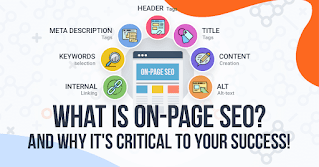on-page optimization search engine optimization (SEO)
search engine optimization (SEO) is one of the most important factors in driving traffic to your website.
While there are many different aspects to SEO, on-page optimization is particularly crucial.
On-page optimization refers to the process of optimizing individual web pages in order to rank higher and earn more relevant traffic from search engines. In this article, we will discuss some of the key elements of on-page SEO and how you can use them to improve your website's rankings.
Keyword Research
Keyword research is the foundation of any successful SEO campaign. It involves identifying the words and phrases that people use to search for information related to your business or industry.
 |
| on-page optimization search engine optimization (SEO) |
By understanding these keywords, you can create content that aligns with the needs and interests of your target audience.
When conducting keyword research, it's important to consider the search volume and competition for each keyword. High-volume keywords can attract a lot of traffic, but they also tend to be more competitive. Long-tail keywords, which are more specific phrases that typically have lower search volume, can be easier to rank for and can attract more targeted traffic. Once you've identified your target keywords, you can begin incorporating them into your website's content.
Title Tags
Title tags are one of the most important elements of on-page optimization. They are the text that appears at the top of a browser tab and are also used as the headline of a search engine result.
A well-crafted title tag should be descriptive, concise, and include your target keyword. To create an effective title tag, it's important to keep it under 60 characters, as this is the maximum length that will be displayed in search results. Including your target keyword near the beginning of the title tag can also help improve your rankings.
Meta Descriptions
Meta descriptions are brief summaries of a web page's content that appear beneath the title tag in search results. While they don't directly impact rankings, they can have a significant impact on click-through rates and user engagement. A well-crafted meta description should be no longer than 155 characters and should accurately describe the content of the page. Including your target keyword in the meta description can also help improve your rankings.
Header Tags
Header tags are used to structure the content of a web page and make it easier to read for both users and search engines. There are six different header tags, ranging from H1 (the most important) to H6 (the least important).
Using header tags helps to create a clear hierarchy of information on your page, with the most important information being placed in
H1 tags.
Including your target keyword in the H1 tag can also help improve your rankings. Content Optimization In addition to optimizing title tags, meta descriptions, and header tags, it's also important to optimize the content of your web pages.
This includes incorporating your target keywords naturally throughout the page, as well as using variations of the keyword and related terms. However, it's important to avoid "keyword stuffing," which is the practice of cramming as many keywords as possible into a piece of content in order to manipulate search rankings. Instead, focus on creating high-quality, informative content that addresses the needs and interests of your target audience.
Internal Linking
Internal linking involves linking to other pages within your website. This not only helps users navigate your site more easily, but it also helps to spread link equity throughout your site. Linking to relevant pages within your website can also help to improve the rankings of those pages. For example, if you have a blog post about a specific topic, you could link to related articles or pages on your website to provide additional information and context.
Mobile Optimization With more people than ever using mobile devices to access the internet, it's crucial to ensure that your website is mobile-friendly.






कोई टिप्पणी नहीं:
एक टिप्पणी भेजें